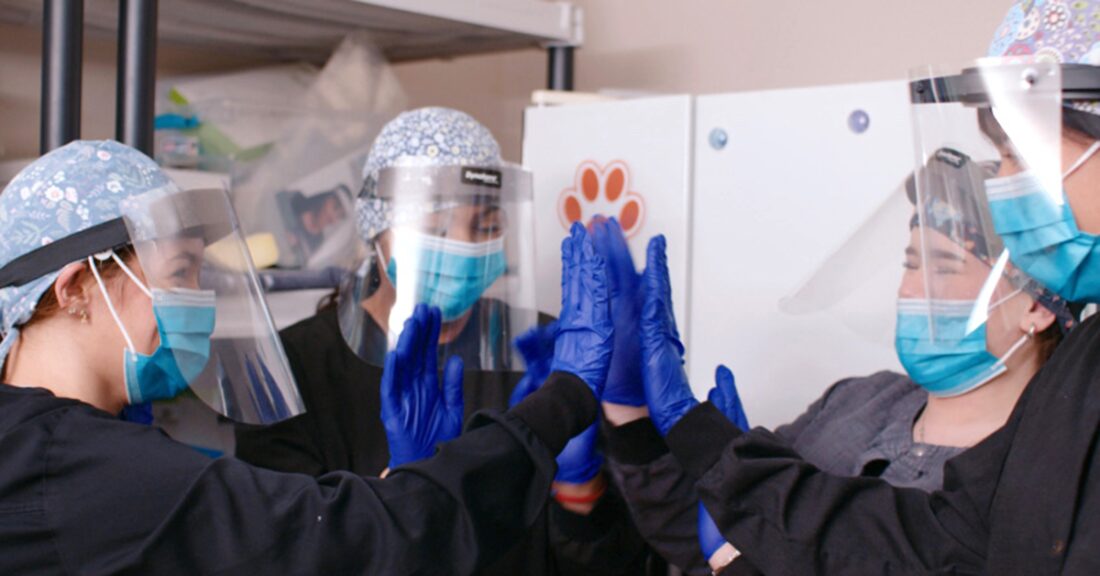Reimagining New Mexico's Secondary and Postsecondary Education

Aztec Family Dental has four X3 NeXt interns this semester. Photo courtesy of Future Focused Education.
Future Focused Education (FFE), based in Albuquerque, New Mexico, is transforming the state’s approach to secondary and postsecondary education and its students’ transition to college and careers. A partner in the Annie E. Casey Foundation’s Thrive by 25® efforts, FFE has developed innovative internship programs, provided technical assistance to school districts and engaged in policy advocacy to increase opportunities for young people.
“Future Focused Education has a laser focus on the well-being of young people, ages 14 through 24, the intended beneficiaries of Thrive by 25,” said Charles Rutheiser, a Casey senior associate. “The organization has been making secondary and postsecondary education much more grounded in the experience of young people, keeping those youth engaged with school or other training and delivering results that are important for students, their families and their communities.”
Removing Barriers to Work and Education in New Mexico
Students from low-income families often must work to meet basic needs. But low-skill, low-wage jobs that can keep students out late interfere with their education and provide little preparation for sustainable careers. High school students in FFE’s X3 internship program have a more meaningful, paid work experience while simultaneously earning school credit.
The X3 program has expanded access to internships for youth who may lack the connections for these valuable opportunities. FFE provides X3 students with what it calls “360-degree support,” which includes comprehensive job orientations and mentorship. X3 also works with employers to ensure both they and students benefit from the internship.
“We have knocked down a lot of bias barriers that box out many young people from these experiences,” said Tony Monfiletto, founder of FFE. “We create the job descriptions with the employers, we interview the students, insure them and provide onboarding support. At the end of the internship, we have an evaluation that is done with the employer.”
Making Successful Post-Secondary Transitions
FFE has been expanding its work into rural areas of New Mexico, where opportunities for internships are scarce. For example, in Des Moines, a remote ranching community in northeast New Mexico, the X3 internship program is enabling students to learn how to use architecture software to design and build a small house. Area participants gather regularly to learn from professional architects and contractors.
To help high school graduates successfully make the transition to further education and careers, FFE developed X3 NeXt. This program pairs students with employers, allowing young people to gain work experience while earning certificates and degrees from colleges and training programs. FFE and the University of New Mexico Hospital have developed a $1 million partnership to fund internships for recent graduates and high school students.
Over the past six years, the X3 and X3 NeXt internship programs have grown to 170 employers, with some 1,500 placements and nearly $2 million paid to young people.
New Mexico’s Innovation Zones
To help support the state’s large population of young people, ages 16 to 24, who are neither in school nor working, the New Mexico Public Education Department established Innovation Zones. The initiative designates high schools that are redesigning education by incorporating proven approaches to engage students in and out of the classroom. Key elements of Innovation Zones include:
- high-quality instruction that combines the cultural background of students with challenging career and technical education;
- personalized support for students; and
- partnerships with families and community organizations.
The Public Education Department has engaged FFE to provide technical assistance to the 47 Innovation Zones statewide. “We have created initiatives that get at some of the hardest-to-solve problems in the state, including young people’s access to high-paying jobs and the way we think about what a young person needs to learn,” said Monfiletto. “All those initiatives are now part of the state’s strategy to redesign high schools.”
Youth Civic Infrastructure Fund
FFE’s Youth Civic Infrastructure Fund provides multiyear grants to nonprofit organizations that seek to integrate young people and schools into their work. Projects embedded in the community and designed by schools and nonprofits provide students with real-world experience addressing community-defined challenges. In Santa Fe, for example, homelessness and housing instability guide the fund’s work. In Aztec, a small rural town in northwest New Mexico, the issue is youth mental health.
FFE has been an effective policy advocate for the well-being of adolescents and young adults. Over the past three legislative cycles, funding for Innovation Zones increased from $12 million to $40 million. This year, the state’s summer internship budget increased from $8 million to $10 million. A recent legislative success changed the state’s graduation requirements to include work-based learning and capstone projects that develop skills that are transferable to careers — for example, teamwork, effective communication and problem solving.





